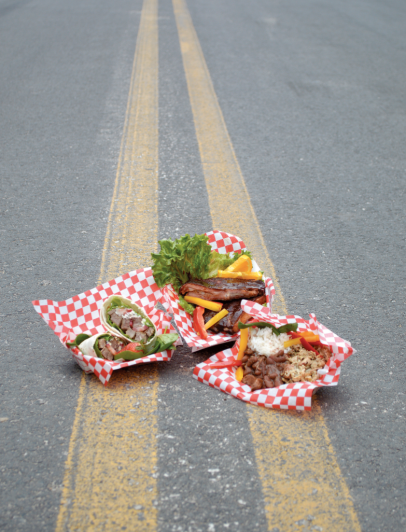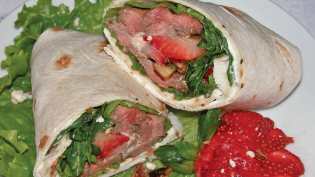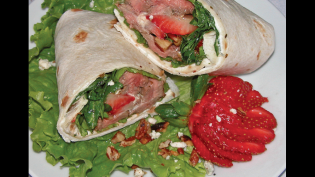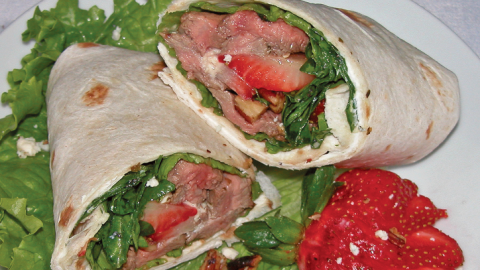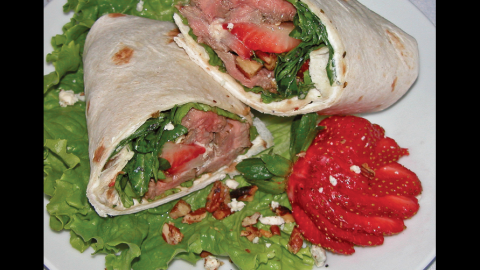KC Food Trucks: Takin’ It To The Streets
They’re hip. They’re sexy. They’re food trucks. And, they’re taking the culinary world by storm. To understand the latest chapter in street food evolution, we need to start with the mortgage crisis of 2008. As the ripples of the financial debacle broadened, one industry after another saw businesses fold. Eventually, the massive layoffs impacted the restaurant business; traditional brick and mortar restaurants were too costly to sustain in this crippled economy, and, consequently, numerous talented chefs were without restaurants. What chefs needed was a low overhead alternative. The opportunity was there, and when restaurants on wheels got together with unemployed chefs, voila, it was a marriage made in heaven.
Today’s food truck is a far cry from the roach coach that offered blue-collar workers not much more than a quick, affordable sandwich and a cup of joe; most food trucks today feature a small list of one of a kind, creative items on the cheap. Gourmet menus are the standard, and run the gamut from ethnic cuisine to outrageous burgers. Today’s street food has been elevated to something you might not otherwise experience outside a four-star restaurant.
The burgeoning gourmet food truck phenomenon was set ablaze in 2009 when Roy Choi began using social media to alert patrons to his Korean BBQ style taco truck’s whereabouts. Choi’s innovative use of social media revolutionized the industry and facilitated its rapid growth and popularity. Five years later, we see a thriving food truck culture with food truck parks, rallies, reality shows, and the creation of associations, including Kansas City’s first food truck association, started by Michael Bradbury, owner of The Funnel Cake Truck.
“At this point there are close to 100 food trucks operating in the Kansas City metro area. Most of those trucks are more like rolling caterers where food can be made right on the spot for fundraisers, weddings, corporate lunches, etc. That was the allure for me; I can do private parties and not have to be out serving the late night bar crowds”, said Bradbury. Anyone who has been around Kansas City for more than a minute knows that we have a long history with food trucks. The Jerusalem Café has been catering to late-night diners street side from their blue and white truck since 1991. And, more recently, we have witnessed a food truck industry so robust that it can literally raise a roof. Or two.
Port Fonda rolled into our midst in a sleek Airstream trailer, served up creative rustic Mexican cuisine, gathered a loyal following, and opted to retire their uber cool, hipster food-mobile in favor of a permanent location in Westport; while others, like Taco Republic, still roll around our city serving mouth-watering tacos from the truck that launched their success even though they have put down roots in Westwood.
For Shawnee residents Doug and Paula Sayles, the impetus to venture into the mobile restaurant movement was the result of several elements coming together. “Doug was bit by the BBQ bug years ago, regularly making food for family and friends. When the construction business crashed in 2010, we decided to start a food business. We had just seen the movie Food Inc. and knew that if we started a business, we didn’t want to contribute to the issues in the food industry. As we researched our options, we were attracted to the new food truck revolution,” said Paula Sayles of Smokin’ Fresh Streetside BBQ.
Today, the number of KC food trucks serving organic, local, sustainable food is small; El Tenedor, Prairie Fire Oven, and Smokin’ Fresh Streetside BBQ are a few of the businesses investing in our local food culture.
Making the commitment to source local, fresh, organic food means signing up for doing things the hard way. While restaurant supply outlets offer one stop shopping, they generally do not stock the needed goods. “We cannot get goods delivered to us. We run in many directions to source local which costs money and time. Add on top of that the fact that everything we use is fresh - we have no fryer, fridge, or freezer on our truck -- and you can see that it is tricky,” Sayles explained.
Smokin’ Fresh Streetside BBQ gets as much meat as they can from Paradise Meat Locker in Trimble, Missouri. “Because a lot of competitive BBQ teams buy their meat from them, it is challenging at certain times of the year. Each cow has only one brisket,” Sayles says with a slight chuckle. “We also try to work directly with meat producers such as Wells Family Farm, and we have sourced from The Local Pig, The Broadway Butcher Shop, and Padgett Pasture-Raised through Fresh KC.”
“If everybody doesn’t change, creating demand for this stuff that is sustainable, then there’s never going to be the motivation for producers to go that route. And, it’s important.” Sayles continued, “The biggest challenge is the meat; our list of local produce farmers is much longer - Blue Door Farm, Stony Crest Urban Farm, Green Gate Farm, Gibb’s Road Farm, Red Bridge Farm, and New Roots for Refugees all provide produce for us. We use Farm to Market and Bread of Life bread. Our sauces come from Meat Mitch BBQ Sauce, Hillsdale Bank, and Mr. Doggity Foods. We couldn’t produce such a quality product without all of these great local businesses.”
Mutually beneficial cooperation is essential in the food truck game, not only for those who are sourcing locally, but also for the industry as a whole. “We have to overcome some unique obstacles as food truck operators. Some people still have sanitation concerns, associating today’s food trucks with roach coaches. They think that we don’t have to follow the same rules as restaurants,” explained Sayles. In deed, food trucks have more frequent inspections than traditional restaurants. And, every food truck on the street must also have a licensed and inspected brick and mortar commissary.
The need to work together is what compelled Bradbury to form The KC Food Truck Association. According to Bradbury, the Westport Food Truck Fest and the Kanrocksas music festival were the two events that really got the movement started here. “Truck owners got together to collaborate for those events. I started a website with the intention to promote Kansas City food trucks at that time, and in 2013, we became the official association.”
Food truck season is upon us, and to the delight of foodies across the city, First Fridays and Warehouse Weekends are back. “Both of these community events feature area food trucks. At First Fridays in the Crossroads, you’ll find a nice food truck park - The Truck Stop - at 21st and Wyandotte. At Warehouse Weekends in the West Bottoms, you’ll find around twenty trucks offering everything from tacos, pizza, coffee, cupcakes, and BBQ, to Cajun, seafood and funnel cakes,” said Bradbury.
The Kansas City food truck scene is alive with healthy competition. New trucks are hitting the streets in record numbers. Yes, our local food trucks are bigger and better than ever, and they are here to stay.
“You say you want a revolution well, well, you know…”
Food Truck Revolution (see image)
Here are some of the resources you will need to see when and where your next meal is parked; www.Truckily.com, based right here in the Crossroads, helps you follow your favorites with a food truck tracker app. Also, check out the KC Food Truck Association and Truck Stop pages on Facebook to see a list of KC’s most popular trucks and upcoming events.
Try this Recipe: Steak and Strawberry Spinach Salad Wraps


